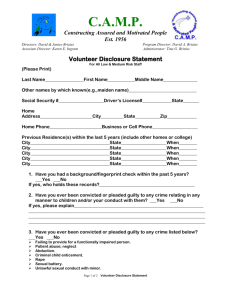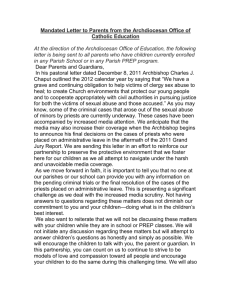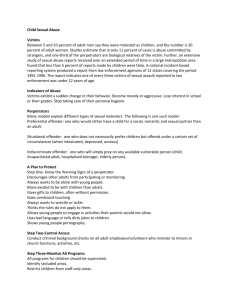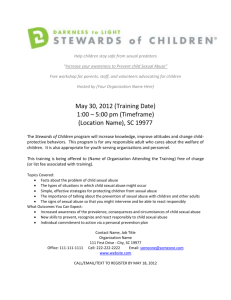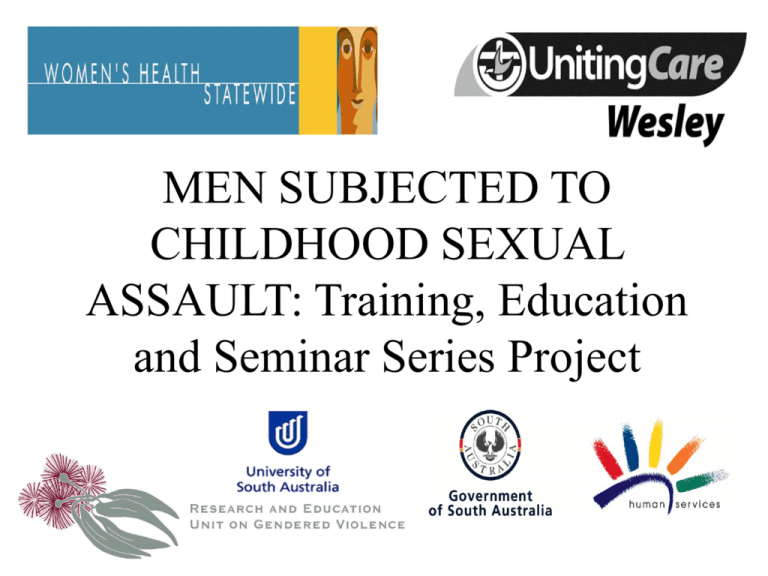
MEN SUBJECTED TO
CHILDHOOD SEXUAL
ASSAULT: Training, Education
and Seminar Series Project
Chair of Launch: Michelle Hogan, Acting Director
Women’s Health Statewide
Partnership Representatives:
•Tracey Sloan, Women’s Health Statewide
•David Tully, Uniting Care Wesley Adelaide, Side Street Counselling
•Dr Donna Chung & Dr Patrick O’Leary, Research and Education
Unit on Gendered Violence, University of South Australia
MEN SUBJECTED TO
CHILDHOOD SEXUAL
ASSAULT: Training, Education
and Seminar Series Project
Launched by:
Hon. Jay Weatherill
Minister for:
Urban Development and Planning
Administrative Services
Gambling
Men who were sexually abused as
children:
Research and Practice Perspectives
Susanne Baylis, Uniting Care Wesley Adelaide, Counselling
Services
Patrick O’Leary, University of South Australia, School of
Social Work and Social Policy, Research and Education Unit
on Gendered Violence
David Tully, Uniting Care Wesley Adelaide, Side Street
Counselling Service
Prevalence
• Statistics Vary
– Over 30% of confirmed reports of child sexual abuse
involve male victims (Fergusson and Mullen, 1999)
– 2.5% to 36% of males
– 6% to 62% of females
• Variance due to different definitions and the fact
that most cases of Child Sexual Abuse goes
unreported.
• Most conservative estimates put the prevalence at
about 1 in 6 males have been sexually abused
whilst under the age of 18 years.
Relationship to Perpetrator
80
70
60
50
% 40
Male
Females
30
20
10
0
Family
Member*
Trusted Adult*
* <.05
Disclosure
100
90
80
70
60
50
40
30
20
10
0
Men
(n=122)
Women
(n=151)
Yes
No
• Males are less likely to
disclose child sexual
abuse at the time.
• This consistent across a
wide range of studies
Responding to Disclosure A
community responsibility: The need
for an appropriate response
• The overwhelming majority of men and women who
disclosed at the time of the abuse reported an
inadequate or negative response. Preferred confidants
were normally family or friends.
• 68% of men recalled that they would have liked to of
told someone at the time of the abuse, but felt unable
to do so.
• Both disclosure and an unmet need to disclose at the
time were associated with increased adverse effects in
later life.
• This leaves children in an invidious position.
“I was so embarrassed that couldn’t find the
words to say exactly what he was doing but
hell I tried often enough. Now I wonder
why they didn’t guess something was
wrong”
“If I could have found sexual abuse in the
white pages I would have come forward
earlier.. I’ve had to tell so many people just
to get here to the group, social security,
community support workers, doctors and
counsellors.”
%
Later Disclosure and Discussion
about Childhood Sexual Abuse
60
Males
50
Females
40
Males study 2
N= 150
30
XX
20
10
0
Less
Less
Less
More
than 1 than 10 than 20 than 20
year
years
years
years
XX<.005
Men take significantly
longer than women to
discuss experiences of
childhood sexual
abuse, in many cases
more than 10 years.
What makes it difficult for males
to disclose experiences of
childhood sexual abuse?
• Many common reasons for both women and
men
– Fear, manipulation, threats, confusion, not
being believed etc…
• More specific to men
– Dominant stereotypes of masculinity
– Homophobia
– Myths about males and sexual victimisation
Later Disclosure and Discussion
about Childhood Sexual Abuse
'Well, it’s just keeping a secret, not letting anybody
into your past. Your so frightened basically of what
your family might say against you, or scared of
reliving the past, that you don’t want to bring it up.
I had what happened in the back of my mind all of
the time, but it felt like if I don’t say anything to
anybody, well one day I might just end it. And if I
went to my grave no one else would ever know
what happened to me'.
Effects of Childhood Sexual
Abuse on Men
60
50
40
Men CSA
SA Men
30
20
10
0
Suicidal
PTSD
• Men who were sexually
abused as children were
10 times more likely to
report suicidal ideation
and PTSD (post-traumatic
stress disorder).
• 17.2% of community men
qualified for a clinical
diagnosis compared to
65.8% of men who were
sexually abused as
children.
“You know it’s really hard to talk about
because I just rolled over and took it and
didn’t do anything about it. So every day I
think about I feel like a piece of crap. That’s
why I don’t like thinking about it.”
Recurring Themes For Males
•
•
•
•
•
•
•
•
•
•
•
•
‘Feeling like things won’t ever get better.’
‘Feeling different to other people.’
‘Thinking I must have asked for the abuse.’
‘Confusion about things generally.’
‘Feeling that people will not believe me if I tell them about
the abuse.’
‘Using alcohol and drugs to cope.’
‘Not feeling worthy to be a man.’
‘Thinking I need to prove myself sexually.’
‘Confusion about my sexual identity.’
‘Feeling depressed.’
‘Nagging thoughts of suicide.’
‘Intense Anger.’
More specific effects and
considerations
• Fears and confusion concerning masculinity and identity
• The influence of homophobia
• Media and societal myths concerning victims becoming
perpetrators, and the resulting fears
• Coping often involves suppression
– Self medication (i.e.: drug use)
– Denial
– Isolation
• The influence of gender and power relations between men
and women
• Excusing abusive or violent behaviour
Masculinity and Identity
•Dominant ideas about masculinity don’t leave
space for being seen as a ‘victim’.
“I would always remember the abuse, always
remember the abuse, but never acknowledged
it’s effects. I’m a man and don’t want to be
seen as anything else.”
Influence of Homophobia
“I was only just starting to understand about
sex. That it was something that only a male
and female participated in and anything else
was not natural. I thought that because I
hadn’t tried to fight him off or died trying,
that meant I encouraged it and must have
wanted to happen and was queer myself.”
Victim to Offender
‘I heard some statistic on the TV that 50 to 60
percent of people that are molested, can end
up doing it to other children in later life.
This made my worst fears come to life,
because I know how what happened to me
affected me, and I couldn’t bear doing that
to another child. I didn’t want that.’
“Well I often heard them described
them (offenders)as sick. But I don’t
think this is right because if they
are sick there must be some of
medical problem and I don’t think
it is. It just lets them off the hook.”
Excusing of abusive and violent behavior
• Often psychological theory draws direct
connection between experience of abuse and
violent behavior
• Dominant men’s culture sets context for justifying
violent and abusive behaviour. Men who
experience abuse experience this culture
• Many men who experience abuse do not use
violence and take clear position against violence.
• It is argued that direct casual explanation are not
helpful assumption in working with men who are
using violence in relationships
Coping often involves
suppression
•Strategies such as denial, self medication (alcohol
and other drugs) and isolation are often
mechanisms men employ
• These strategies all have effects on the man’s
psychological and emotional well being
• This therefore effects the wider networks of
relationships and community that they are
involved in e.g. family, friends, work,education
“You always think people are trying to
deceive you or work on you. Your always
wary looking for ulterior motives. After a
while you start to isolate yourself”
“ I’ve noticed I become cut off, not being
there on a psychological level and a
physical level. Its like a way of coping,
separating yourself from all that happened”
Social Context Of Sexual Abuse
• Extent of sexual abuse raised as a social issue by
women’s movement over the last thirty years.
• Recently sexual abuse of men became more of a
prominent issue and body of knowledge and
service delivery models is emerging
• Sexual abuse of male children and adolescents
occurs within a male dominated culture
• Sexual abuse of males(as with females) is
predominately perpetrated by older men
Future Directions
• Research
– Disclosure what is the experience like for children today
– Community attitudes
– Men’s coping
• Community Development
– Improving knowledge/recognition and responses
– Prevention and education strategies
• Service Provision
– Professional development for all workers
– Need for more specialist services across South Australia
• Policy and Legal
– Clear position statements
– Institutional review and acknowledgement of sexual abuse
– Increased support for victims through process
Community Development
• Strategies to raise profile of men and sexual abuse
through a range of awareness raising activities e.g.
advertising, education, accessible information
• Organisations need to support intervention and
prevention strategies that acknowledge sexual
abuse occurs to both men and women.
• This would allow clients to more readily raise the
issue if they choose to with family, friends and
service providers.
• More awareness in general community would
allow facilitate greater support for men and
women subjected to abuse in social networks
Service Provision
• All workers in the human service needs to
receive appropriate level of training around
responding to sexual abuse. This includes entry
level training, specialist/specific training and
ongoing professional development
• The purpose of the training is to allow service
providers to be more able to effectively respond
to disclosure of experiences of abuse
• Desperate need for more specialised service to
provides counselling and other service to men
and women who have been subjected to
childhood sexual abuse
“When
you do build up the courage and
energy to tell someone for them to not
believe you it’s devastating….
Opening up things so deep and
personal is so hard, one of the worse
things is that could ever happen is that
you aren’t believed”
Hopeful quotes
• “Not blaming yourself helps, you were an
innocent child and they were an adult. You feel
bad.. I was going to do myself in..but if you do,
you don’t win, your parents don’t win..he
wins..they’ve broken your spirit..he thought he
would always have me..he was wrong”
• “Shifting the blame, knowing that you weren’t
responsible. Also being my own man has
helped...I am what I am. I try not to conform..I
don’t want to be one of the crowd, I’ve had
that..and I don’t want that”
A Final Word
• ‘I would have loved to have been able to have
gone to my parents and said this has happened.
But it was not possible. So I think the best thing to
do is to know that this situation [sexual abuse]
does not define you as a person - it doesn’t dictate
what’s going to happen to you... but to a certain
extent it will if you let it, it can overrun your
life… So I think hiding is the worst thing to do,
but it’s hard because of the shame in society…
especially as a man.’
MEN SUBJECTED TO
CHILDHOOD SEXUAL
ASSAULT: Training, Education
and Seminar Series Project
A Partnership Between:
Research and Education Unit on Gendered Violence,
University of South Australia
Women’s Health Statewide
&
Uniting Care Wesley, Adelaide
Funded by the Department of Human Services, South
Australian Government
Men Subjected to childhood Sexual
Assault: Training, Education and
Seminar Series
One Day Seminar on Thursday 22 April
9.30 – 4 pm (see Registration Forms)
Training in Country Regions
•Berri (booked out) 18 – 19 March
•Mount Gambier 11 &12 march
•Port Pirrie 1 & 2 April
Men Subjected to childhood Sexual
Assault: Training, Education and
Seminar Series
• Focus Group with men for the development of
resources to be held April/May – Please contact
Kristina for involvement.
kristina.birchmore@unisa.edu.au
• Anticipated availability of the Resource for Men at
the July Forum
• Launch of the Report/Resource Guide for Practice
with Men subjected to childhood sexual abuse – to be
available at the July Forum
• Evaluation forms to assist in the further development
of the forums (please complete at the conclusion of
the presentation)


